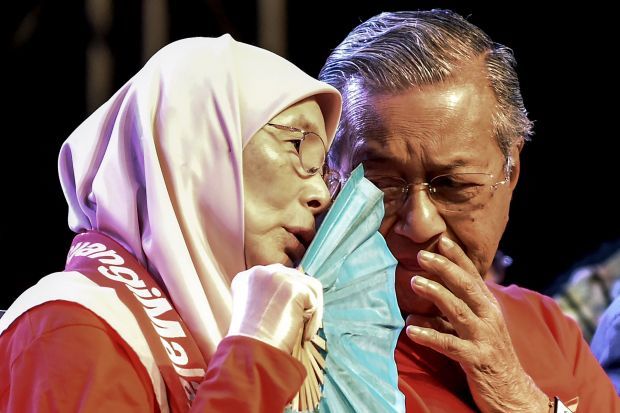Wan Azizah Wan Ismail’s childhood ambition was to become a doctor and cure disease. Now that she is Malaysia’s most powerful female politician, she says her mission is to improve women’s rights.
The 65-year-old made history this month when she was named Malaysia’s deputy prime minister. She is the first woman to hold the post, and one of only a handful of female politicians in high public office in Southeast Asia.
Wan Azizah has vowed to push for greater women’s rights in a country where female representation in national legislatures is among the world’s lowest.
“Women now see that you can break barriers, it can happen — with a little bit of perseverance, commitment and belief that you can actually do it,” she said at her office in the administrative capital, Putrajaya. (Thomson Reuters Foundation, 29/5/2018)
Comment:
Many people enter the current political system with a desire to make a positive change. They may have sincere intentions but after some time will see that ‘good intentions’ are not enough.
Wan Azizah said, “There are some laws that you have to change, anti-harassment, anti-domestic violence, these are the things we have to go through.” She also said the government will also look into policies to help women in workplaces, especially mothers, by improving childcare facilities. (Thomson Reuters Foundation, 29/5/2018)
In the democratic system of government, we will see women representing women’s issues, people of a certain religion or race pushing issues that concern that group and so on. Democracy gives us the impression that each person coming into power will be able to push the agenda of that group. This was after all democracy’s original idea, representation of the masses so everyone gets a say. This is seen as a positive approach and countries like Canada, under the current government, can boast of the most represented cabinet, with probably the best selection of each group in that society.
The reality is that each person, despite their own personal background will be tied to the overall policies and also the overall system. You have to tow the party line and you have to overall be in line with the Capitalist, secular framework.
We see this when Islamic parties come into power. Gaining the vote due to increased Islamic sentiments, but in the end having to abide by the secular framework. Tunisia recently passed a law to allow a Muslim woman the right to marry a non-Muslim man and a law for equal inheritance. Both laws go against the Shariah, and were passed under the pressure of secularists in a Muslim country with a so-called Islamic party in coalition.
So, it is seen that change does not come by a representative cabinet but it is affected by the system that is implemented. Also, overall betterment means everyone should feel change, not just selected groups.
Islam defines politics as, ‘looking after the affairs of the people’ and Western system of politics is not the same. Even if women will get better employment laws or there are tougher laws on violence and discrimination by this newly elected female deputy PM, can we say that the overall status of the society will improve? The answer is no. Whilst one group is given rights, another will still not get there’s. For example, will the situation for children improve, or for foreign workers, or the economy?
Islam looks at the society as a whole and does not selectively push for the rights of a particular group. Each elected or appointed member of the Islamic system of governance, the Khilafah will work for the society as a whole, not just for particular groups.
The Islamic political system is unique in that it allows all citizens a voice by engaging in an obligation of ‘amr bil maroof wanahi anil munkar’ (commanding the good and forbidding the evil). The woman questioning the Khaleefah Umar Al Khattab (RA) was not an elected member of government but she affected policy by questioning the limitation of the mahr by the ruler. Each citizen is actually responsible to make sure the laws are adhered to, as they are the fixed laws from Allah (swt).
It is more incumbent to ask, why is it that women do not have the rights Wan Azizah is calling for and what is the best way to secure them? Anyone wishing to sincerely make changes needs to realize fixing a few laws in the current secular framework will be as useful as a band aid to a broken arm. The solution is only cosmetic and will never heal the real trauma.
What is needed in Malaysia and all our Muslim lands is to revert back to our own system of ruling, the Khilafah (Caliphate) based on the methodology of the Prophethood and not raise the Ummah’s hopes that the Secular, Democratic, Capitalist model will somehow rescue us, for it is the actual cause of our problems.
Nazia Rehman

